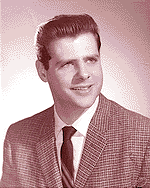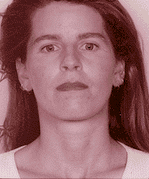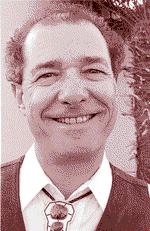 |

 Kenneth Shorr, fine art photographer and associate professor
at the University of Arizona. (His exhibit Surgically Induced
Childhood will open at the UA Joseph Gross Gallery on January
17, and includes two performance pieces:) Because of a myriad
of neurological maladies, I find myself both reading and re-reading
several books simultaneously, including the novel Concrete,
by Thomas Bernhard. A couple of people told me to read Bernhard
because he's as depressing as I am, but I've found his work more
funny than anything. I'm also reading Imagining Monsters,
by Dennis Todd. It's a very interesting book about how the confidence
of science was undermined in the 17th century by a woman who fooled
the entire scientific community into believing she'd given birth
to rabbits. She and her husband put weird organisms in her body,
then she would pretend to go into labor and he would pull them
out. I'm reading T.S. Eliot, Anti-semitism, and Literary Form,
by Anthony Julius; The Failure Of British Fascism, by Mike
Cronin; and The Erotic In Sports, by Allen Guttmann, as
well. I'm also rereading Nabokov's Lolita, which is the
greatest thing I've ever read in my life, and it gets better each
time. It's so beautifully written and unrelated to the world.
Kenneth Shorr, fine art photographer and associate professor
at the University of Arizona. (His exhibit Surgically Induced
Childhood will open at the UA Joseph Gross Gallery on January
17, and includes two performance pieces:) Because of a myriad
of neurological maladies, I find myself both reading and re-reading
several books simultaneously, including the novel Concrete,
by Thomas Bernhard. A couple of people told me to read Bernhard
because he's as depressing as I am, but I've found his work more
funny than anything. I'm also reading Imagining Monsters,
by Dennis Todd. It's a very interesting book about how the confidence
of science was undermined in the 17th century by a woman who fooled
the entire scientific community into believing she'd given birth
to rabbits. She and her husband put weird organisms in her body,
then she would pretend to go into labor and he would pull them
out. I'm reading T.S. Eliot, Anti-semitism, and Literary Form,
by Anthony Julius; The Failure Of British Fascism, by Mike
Cronin; and The Erotic In Sports, by Allen Guttmann, as
well. I'm also rereading Nabokov's Lolita, which is the
greatest thing I've ever read in my life, and it gets better each
time. It's so beautifully written and unrelated to the world.
 Jami Macarty, director of this year's Tucson Poetry Festival:
I'm reading The Poetics of Space, by Gaston Bachelard.
Bachelard is a philosopher, and this is a book essentially about
his philosophy on poetry--specifically, the idea of space and
inhabiting space. He writes about both the intimacy and the immensity
of space, and how it can define everything. He's interested in
how the poet makes an image of a space--forests, rooms, closets,
shelves, corners--then creates an idea of how that image is inhabited.
He also discusses why the poet is attracted to these kinds of
spaces, how there's something about physical space that is a sort
of metaphor for the imagination. For example, he writes: "A
nest, and this we understand right away, is a precarious thing,
and yet it sets us to daydreaming of security." It's abstract
but very simply written.
Jami Macarty, director of this year's Tucson Poetry Festival:
I'm reading The Poetics of Space, by Gaston Bachelard.
Bachelard is a philosopher, and this is a book essentially about
his philosophy on poetry--specifically, the idea of space and
inhabiting space. He writes about both the intimacy and the immensity
of space, and how it can define everything. He's interested in
how the poet makes an image of a space--forests, rooms, closets,
shelves, corners--then creates an idea of how that image is inhabited.
He also discusses why the poet is attracted to these kinds of
spaces, how there's something about physical space that is a sort
of metaphor for the imagination. For example, he writes: "A
nest, and this we understand right away, is a precarious thing,
and yet it sets us to daydreaming of security." It's abstract
but very simply written.
 Bob Beaudry, businessman, water activist: I read a lot
of periodicals, Time, Newsweek, and I read the newspaper
every morning. I don't watch TV or listen to the radio; I learn
about what's going on in the world through reading periodicals.
I need to stay in touch with the economy around the world so I
can run my business, and reading fiction doesn't help with that.
The only book I've cracked open in years, to tell the truth, is
the Bible, the New Testament. It gives me guidance in my life.
Besides that, I sometimes will re-read Dr. Atkin's Superenergy
Diet just to refresh my memory on it--I've read it before--and
Durk Pearson & Sandy Shaw's Life Extension: A Practical
Scientific Approach. It tells you everything you want to know
about vitamins. It's the best vitamin book written by far--I don't
want to live forever, but I'm trying to improve the quality of
life while I'm alive. They give footnotes on everything--you can
go over to the library and look up every study he cites. It is
by far, to me, the most accurate and informing book on vitamins
ever written.
Bob Beaudry, businessman, water activist: I read a lot
of periodicals, Time, Newsweek, and I read the newspaper
every morning. I don't watch TV or listen to the radio; I learn
about what's going on in the world through reading periodicals.
I need to stay in touch with the economy around the world so I
can run my business, and reading fiction doesn't help with that.
The only book I've cracked open in years, to tell the truth, is
the Bible, the New Testament. It gives me guidance in my life.
Besides that, I sometimes will re-read Dr. Atkin's Superenergy
Diet just to refresh my memory on it--I've read it before--and
Durk Pearson & Sandy Shaw's Life Extension: A Practical
Scientific Approach. It tells you everything you want to know
about vitamins. It's the best vitamin book written by far--I don't
want to live forever, but I'm trying to improve the quality of
life while I'm alive. They give footnotes on everything--you can
go over to the library and look up every study he cites. It is
by far, to me, the most accurate and informing book on vitamins
ever written.

|
 |

